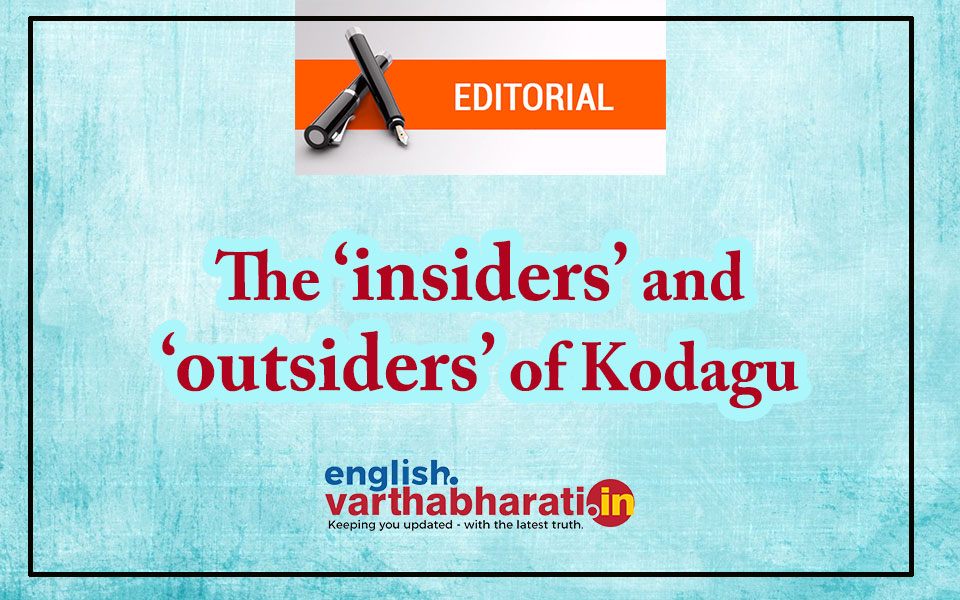Central defence minister Nirmala Sitharaman was in Kodagu recently to survey the damage caused by recent torrential rains and floods. A group of environmentalists met her when she came to attend the meeting in Deputy Commissioner’s office. The most important aspect is that there were a few retired army men in the team that awaited her audience. Instead of coming straight to this meeting, she engaged in a conversations with environmentalists. They wanted to brief her about the destruction caused on ecology, mining and damage-causing activities that were happening in Kodagu in the name of development contributing to the present state of challenge that the tiny region found itself in.
Just as she was getting an update on all this, the elected representatives from BJP and Congress began to insist that the minister aborts this conversation and proceeds to attend the meeting organized by district administration. Their argument was the officers and teams engaged in relief operations were waiting for the minister to address the meeting so that they could proceed with their work for the day. This naturally upset the minister. Though she said she was speaking to the ex-army men, BJP leader K G Bopaiah said the minister could do as she pleases. This line of speech was used by district in charge minister too who tried to embarrass the BJP members, and this further complicated the matters and riled up the minister. As a result of all this, the union minister left flood ravaged Kodagu in a huff.
The phobia that affects the elected representatives and environmentalists is not a new phenomenon. What rights did the elected representatives of BJP have to insist that the minister shouldn’t engage with the environmentalists of Kodagu? Why would they assume the environmentalists were speaking against the interest of Kodagu, while the whole world is discussing the ill effects of unabated ‘development’ happening unmindful of the topography of the areas? When the environmentalists speak about the ecology and indigenous characteristics of the area, they are branded as ‘enemies of development’.
Politicians have even attacked many environmentalists and locals as well. Many have been called the ‘outsiders’ just to dissuade them from engaging in Kodagu’s safety. “What do the outsiders know?” ask the estate owners of this area whenever the question of Kodagu welfare arises. Even at the time of floods destroying the livelihoods of Kodagu, such questions were being asked. This line of argument was used even when NGOs tried to reach relief materials to deserving people. “What do you know about this place?”
As far as ecology is concerned, Kodagu is a very complex region to be understood. Generalisations about Kodagu can only make the understanding more complicated. Hence, the ‘outsiders’ are always viewed with suspicion for that matter. Even culturally Kodagu is inimitable. For the same reason, outsiders are yet to be accepted wholeheartedly in this closely guarded fort.
Thousands have migrated to Bangalore and other places from Kodagu. Fanatics have used this area to spread their activities. But none have been rejected in the outside world. There are some organisations that look down upon Malayalam speaking people as untrustworthy. They have camouflaged their own mistakes and held others responsible for the destruction they have caused. Only after Sangh Parivar founds its roots in Kodagu, the feeling of ‘insiders’ and ‘outsiders’ has gotten strong. They have been successful in using this argument to keep people at bay. Which is why they fret at the sight of Gadgil or Kasturi Rangan reports that speak about conserving Kodagu, and Kerala.
Open discussions are not being allowed about the topic. If the government persists, they speak about ‘separate state’ demand. Rain is not the sole cause for destruction in Kodagu. The interference and exploitation of hills and mountain regions in the name of development has led to the disaster. Experts say climatic changes have caused the torrential rains and destruction. But the destructive development has had a major share in the situation Kodagu and Kerala are facing today.
Kerala government has admitted that the water released from Mulla Periyar dam caused flooding. This dam has always been a looming threat to Kerala. Ecologists have said this dam would be the reason for Kerala going underwater someday. But all these warnings and cautions are seen as bitter pills to those who are bent upon pilfering the area. Forget the Gadgil report, the state must at least try and implement Kasturi Rangan report to aid sustained development of Kodagu. Everyone who wants to conserve Kodagu is a Kodava in spirit. But those who are living here yet causing destruction are to be seen as vested interests. Let the best interest win.
Let the Truth be known. If you read VB and like VB, please be a VB Supporter and Help us deliver the Truth to one and all.
Kalaburagi: Four men have been arrested in Kalaburagi on charge of hacking a man with lethal weapons and pelting stones at him under the limits of Station Bazaar Police Station recently.
According to police sources, Anand Jalak Shinde (34), Ashitosh Jalak Shinde (30), Imran Mehboob Sheikh (28) and Sohaib Anwar Qureshi have been arrested. The men are accused of the brutal murder of Syed Mehboob, a resident of Station Bazaar Upper Line Hamalawadi in the city.
An FIR was filed by the Station Bazaar Police Station based on a complaint given by Syed Ismail, father of the deceased Syed Mehboob.
Following quick probe, the police team successfully arrested the suspects within 24 hours. The arrested men were produced in court and have been sent to judicial custody.
The City Police Commissionerate has appreciated in an official release the police team’s quick solving of the murder case and arrest of the four men accused of murdering Syed Mehboob.





